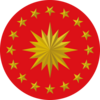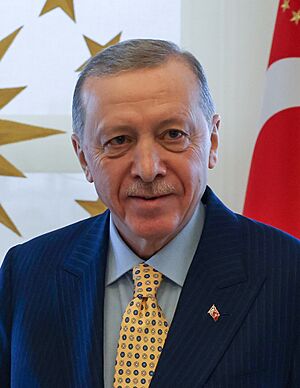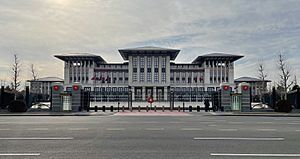President of Turkey facts for kids
Quick facts for kids President of theRepublic of Türkiye |
|
|---|---|

Presidential standard
|
|

Presidential seal
|
|
| Executive branch of the Turkish government | |
| Style |
|
| Member of | Cabinet National Security Council Supreme Military Council |
| Residence | Presidential Complex |
| Appointer | Direct popular vote |
| Term length | Five years,
renewable once
|
| Constituting instrument | Constitution of Turkey (1982) |
| Inaugural holder | Mustafa Kemal Atatürk |
| Formation | 29 October 1923 |
| Deputy | Vice President |
| Salary | ₺1,428,000/US$ 75,435 (2023) |
The President of Turkey, officially called the President of the Republic of Türkiye (Turkish: Türkiye Cumhuriyeti Cumhurbaşkanı), is the top leader of the country. They are both the head of state (representing Turkey to the world) and the head of government (leading the country's daily operations). The President is also the boss of the military and leads the National Security Council, which helps keep the country safe.
The role of President was created when the Republic of Türkiye was formed on October 29, 1923. Mustafa Kemal Atatürk, the founder of modern Turkey, was the very first President. For a long time, the President's job was mostly ceremonial, meaning they represented the country but the Prime Minister held most of the power.
However, things changed after a vote in 2017. New rules were added to the Constitution that removed the Prime Minister's job. This gave the President full executive powers, meaning they now have complete control over the government's daily work. This change officially started after the 2018 general election. Today, the President is chosen directly by the people of Turkey for a five-year term.
In Turkish, the President is called Cumhurbaşkanı, which means "Republic leader." The current President is Recep Tayyip Erdoğan, who became the 12th President on August 28, 2014.
Contents
History of the Presidency
The role of President began when Turkey became a republic on October 29, 1923. On that day, Mustafa Kemal Atatürk was chosen as the first President. Until 2014, most presidents were elected by the Turkish Grand National Assembly (Turkey's parliament).
Some early presidents, like Mustafa Kemal Atatürk, İsmet İnönü, and Celâl Bayar, were also leaders of political parties. Atatürk and İnönü were both President and chairman of the Republican People's Party. Celâl Bayar resigned as chairman of the Democrat Party when he became President, but he stayed a party member.
After a military takeover in 1960, a new Constitution in 1961 said that presidents should not be connected to political parties. This was to make sure they were fair to everyone.
In 2007, another change was made to the Constitution. It was decided that the people would directly elect the President. The first election under this new rule happened on August 10, 2014, when Recep Tayyip Erdoğan was elected by popular vote. After the 2017 constitutional changes, the President became both the head of state and the head of government.
What the President Does
Leading the Country
As the head of state, the President represents Turkey to its own citizens and to other countries around the world. It is important to show respect for the President.
Leading a Political Party
Often, leaders of political parties want to become President. They can also choose to support someone else from their party to run for the position.
From 1961 to 2017, presidents had to leave their political parties. This rule was in place to ensure the President was neutral and fair. However, after the 2017 changes, the President became the main leader of the government. Because presidents are now elected by winning a political contest, they can remain connected to their party.
Being a Regional Leader
Turkey's presidents are seen as important leaders in their region. This is because Turkey is in a key location, has influence, a strong economy, and a rich history. Their involvement in diplomacy, helping solve problems, giving aid, and working with other countries shows Turkey's role in making the region stable and successful.
How a President is Chosen
Who Can Be President?
To become President, a person must meet a few requirements:
- They must be a Turkish citizen who can also be a member of parliament.
- They must be at least 40 years old.
- They must have finished university.
If someone running for President is already a member of the Turkish Grand National Assembly, they must leave their seat in parliament if they win. This keeps the different parts of government separate.
The Election Process
The rules for electing the President are in the Constitution and the Presidential Election Law.
The President is elected by a direct vote of the people. To win in the first round, a candidate needs to get more than half of all the votes. If no one gets more than half, a second round of voting happens two Sundays later. In this second round, only the top two candidates from the first round compete. The candidate who gets the most votes in the second round wins.
If one of the top two candidates cannot participate in the second round, the next candidate with the most votes from the first round takes their place. If only one candidate is left for the second round, the vote becomes like a "yes" or "no" referendum on that candidate. If that candidate doesn't get more than half the votes, a new presidential election is held.
Before the 2007 changes to the Constitution, the Grand National Assembly used to elect the President from among its own members.
Taking Office
Before starting their job, the President must say an oath. This is the only part of the inauguration ceremony required by the Constitution. The oath is:
In my capacity as President of the Republic, I swear upon my honour and integrity before the Great Turkish Nation and before history to safeguard the existence and independence of the state, the indivisible integrity of the country and the nation, and the absolute sovereignty of the nation, to abide by the Constitution, the rule of law, democracy, the principles and reforms of Atatürk, and the principles of the secular republic, not to deviate from the ideal according to which everyone is entitled to enjoy human rights and fundamental freedoms under conditions of national peace and prosperity and in a spirit of national solidarity and justice, and do my utmost to preserve and exalt the glory and honour of the Republic of Turkey and perform without bias the functions that I have assumed.
The inauguration takes place in the Grand National Assembly. The oath ceremony is always shown live on TV.
How Long a President Serves
Term Limits
A President is elected for a five-year term and can be re-elected once. However, if a President's term ends early because parliament decides to remove them, they can run for an additional term. That incomplete term doesn't count towards the two-term limit.
The current President stays in office until the new President officially takes over. Before the 2007 constitutional changes, presidents were elected for a single seven-year term.
When the Office is Empty
If the President's office becomes empty for any reason, and there is one year or less until the next general election for parliament, the presidential election happens at the same time as the parliamentary election. This takes place on the first Sunday after 60 days from when the office became empty.
If the President's office becomes empty and there is more than one year left until the next general election, the presidential election is held within 45 days. The new President elected in this way serves until the next general election. This period does not count as a full term for them.
If elections cannot be completed, the current President stays in office until a new one is chosen. If there is a war, the presidential election can be postponed for one year by the Turkish Grand National Assembly. This postponement can be repeated if the war continues.
Accountability
After 2017
After the 2017 constitutional changes, the President can be investigated by the Grand National Assembly. If a simple majority of members propose it, and three-fifths of them approve, an investigation can begin. A special committee of 15 members from parliament will carry out the investigation and report their findings. If two-thirds of the Assembly members vote secretly to approve the report, the President can be tried by the Constitutional Court.
If an investigation has started, the President cannot call for new elections. If the President is found guilty by the Constitutional Court, they are removed from office. These rules also apply to actions the President might have taken while in office.
Before 2017
Before the 2017 changes, the President was not usually held responsible for their actions or orders, unless it was for a very serious crime like high treason. Most presidential decisions had to be signed by the Prime Minister and other ministers, who were then responsible for those decisions. Decisions made by the President alone could not be challenged in court. The only way to hold the President accountable was through a process similar to impeachment for high treason, which required a large majority vote in parliament.
Where the President Lives
The Presidential Complex in Ankara is the official home of the President. It was officially opened by Recep Tayyip Erdoğan on October 29, 2014, which is Turkey's Republic Day. Before 2014, the Çankaya Mansion was the President's residence.
The Presidential State Guesthouse is used to host official guests and can also be a secondary home for the President. Other places like the Huber Mansion, the Florya Atatürk Marine Mansion, and the Vahdettin Pavilion have been used as presidential offices or summer homes.
Key Responsibilities of the President
The President's main duties are listed in the Constitution:
- The President gives the opening speech to the Grand National Assembly at the start of each new legislative year.
- The President can call the Grand National Assembly to meet if needed.
- The President can approve laws or send them back to the Grand National Assembly to be looked at again (this is like a veto).
- The President can ask the Constitutional Court to cancel laws or parts of laws if they are against the Constitution.
- The President appoints and removes the Vice President and other government ministers.
- The President is the Commander-in-chief of the Turkish Armed Forces, protecting Turkey's borders and independence.
- The President appoints high-ranking military officers, including the Chief of the Turkish General Staff.
- The President appoints Turkey's ambassadors to other countries and welcomes foreign ambassadors to Turkey.
- The President can negotiate, sign, and approve international agreements.
- The President can suggest changes to the Constitution of Turkey to be voted on by the public.
- The President can reduce or cancel criminal sentences for people who are very sick, disabled, or elderly.
- The President can call for new elections for both the Grand National Assembly and the presidency, ending their own term early.
- The President presents a budget plan to the Grand National Assembly for approval.
- The President calls and leads meetings of the National Security Council.
- The President can declare a state of emergency, but this needs approval from the Grand National Assembly.
- The President can issue executive orders, which are rules for how the government operates. These orders cannot go against the Constitution or existing laws. If a new law is passed on the same topic, the executive order becomes invalid.
- The President appoints members and the chairman of the State Supervisory Council to carry out investigations.
- The President appoints many judges and legal officials, including 12 of the 15 members of the Constitutional Court.
The President also performs other duties given to them by the Constitution and other laws.
Acting President
After 2017
Since the 2017 constitutional changes, if the President is temporarily away due to illness, travel, or other reasons, the Vice President of Turkey steps in as Acting President. They exercise the President's powers until the President returns.
If the President's office becomes permanently empty, a new presidential election must be held within 45 days. In the meantime, the Vice President acts as President. If there is one year or less until the next general election for parliament, the parliamentary election will happen at the same time. If there is more than a year left, the newly elected President will serve until the next general election.
Before 2017
Before the 2017 changes, the speaker of the Grand National Assembly would serve as Acting President if the presidency was temporarily or permanently empty. They would exercise presidential powers until the President returned or a new President was elected within 45 days.
Latest Election
Presidential elections were held in Turkey in May 2023, along with parliamentary elections. This election chose a president for a five-year term.
Timeline of Presidents
This timeline shows the presidents of Turkey and their political party when they took office.
Timeline generation failed: 4 errors found
Line 30: at:2026 color:TODAY width:0.1
- LineData attribute 'at' invalid.
Date '2026' not within range as specified by command Period.
Line 97: from:2007 till:2026
- Plotdata attribute 'till' invalid.
Date '2026' not within range as specified by command Period.
Line 104: from:2014 till:2026
- Plotdata attribute 'till' invalid.
Date '2026' not within range as specified by command Period.
Line 109: from:2014 till:2026
- Plotdata attribute 'till' invalid.
Date '2026' not within range as specified by command Period.
See also
 In Spanish: Presidente de Turquía para niños
In Spanish: Presidente de Turquía para niños
- President of Northern Cyprus
- Official state car
- Presidential Guard Regiment
- List of cabinets of Turkey
 | Audre Lorde |
 | John Berry Meachum |
 | Ferdinand Lee Barnett |




